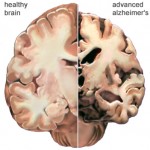NIH PANEL: NO PREVENTION OR CURE FOR ALZHEIMERS YET
Posted on August 29, 2010 by Jeffrey Newman
 An article in the NYTimes highlights the conclusions of a panel of distinguished scientists appointed by The National Institute of Health that no evidence that anything exists to reduce the risk of Alzheimer’s disease.http://www.nytimes.com/2010/08/29/health/research/29prevent.html. For several months, I have been reporting here on Alzheimer’s research, partricularly new hypotheses on its cause and the more than hundred clinical studies on drugs under study. The NIH panel findings reflect the early stages to the progress that is being made. The discovery of the Alzheimer’s gene, the first real confirmation of the existence of the unique disease happened only 25 years ago, a short time frame in the field of medical science. Much of the new work relates to finding therpies that seem to work on a cellular level, for reasons not yet known and that knowledge is quickly advanced into animal studies in the hope that the hypotheses can take fruit. As much as any disease time is the enemy though. For the 18 milion with the insidious disease, all eyes are on the clinical studies under way. Breakthroughs in understanding the disease at a basic level, the engine that could thrust the timetable forward to the development of a drug that will slow or treat Alzheimers before cognitive damage is done in the 10 year development of the disorder is the method that works. Slow but steady incremental work in laboratories, which are now cooperating with each other, sharing their data worldwide is surely to result in success. We just don’t know when, nor can we model a time table. Meanwhile, the damage continues to mount and increase. The 18 million cases is expected to reach 36 million by 2025. The personal and economic burdens of the disease are enormous and also increasing significantly. The NIH, now playing a critical role as a strategic oversight organization is in a critical position to help make decisions on which drugs show the most promise and why and what efforts should receive the most funding.
An article in the NYTimes highlights the conclusions of a panel of distinguished scientists appointed by The National Institute of Health that no evidence that anything exists to reduce the risk of Alzheimer’s disease.http://www.nytimes.com/2010/08/29/health/research/29prevent.html. For several months, I have been reporting here on Alzheimer’s research, partricularly new hypotheses on its cause and the more than hundred clinical studies on drugs under study. The NIH panel findings reflect the early stages to the progress that is being made. The discovery of the Alzheimer’s gene, the first real confirmation of the existence of the unique disease happened only 25 years ago, a short time frame in the field of medical science. Much of the new work relates to finding therpies that seem to work on a cellular level, for reasons not yet known and that knowledge is quickly advanced into animal studies in the hope that the hypotheses can take fruit. As much as any disease time is the enemy though. For the 18 milion with the insidious disease, all eyes are on the clinical studies under way. Breakthroughs in understanding the disease at a basic level, the engine that could thrust the timetable forward to the development of a drug that will slow or treat Alzheimers before cognitive damage is done in the 10 year development of the disorder is the method that works. Slow but steady incremental work in laboratories, which are now cooperating with each other, sharing their data worldwide is surely to result in success. We just don’t know when, nor can we model a time table. Meanwhile, the damage continues to mount and increase. The 18 million cases is expected to reach 36 million by 2025. The personal and economic burdens of the disease are enormous and also increasing significantly. The NIH, now playing a critical role as a strategic oversight organization is in a critical position to help make decisions on which drugs show the most promise and why and what efforts should receive the most funding.
